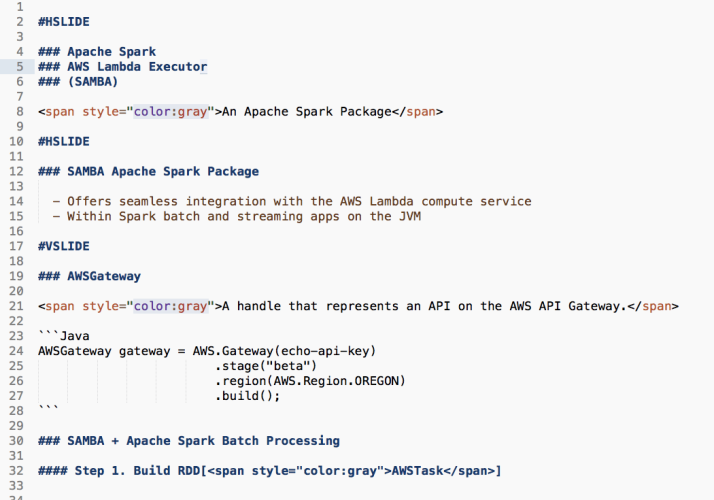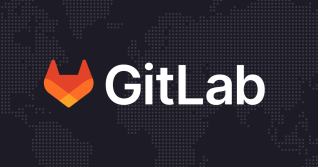Two GitLab team-members, Robert and Douwe, took our "the company will cover travel costs to visit colleagues" policy and ran with it, spending six months visiting and working with 49 different colleagues in 20 cities, in 14 countries, on five continents. Read on for the who, what, why, and where.
{: .text-center}
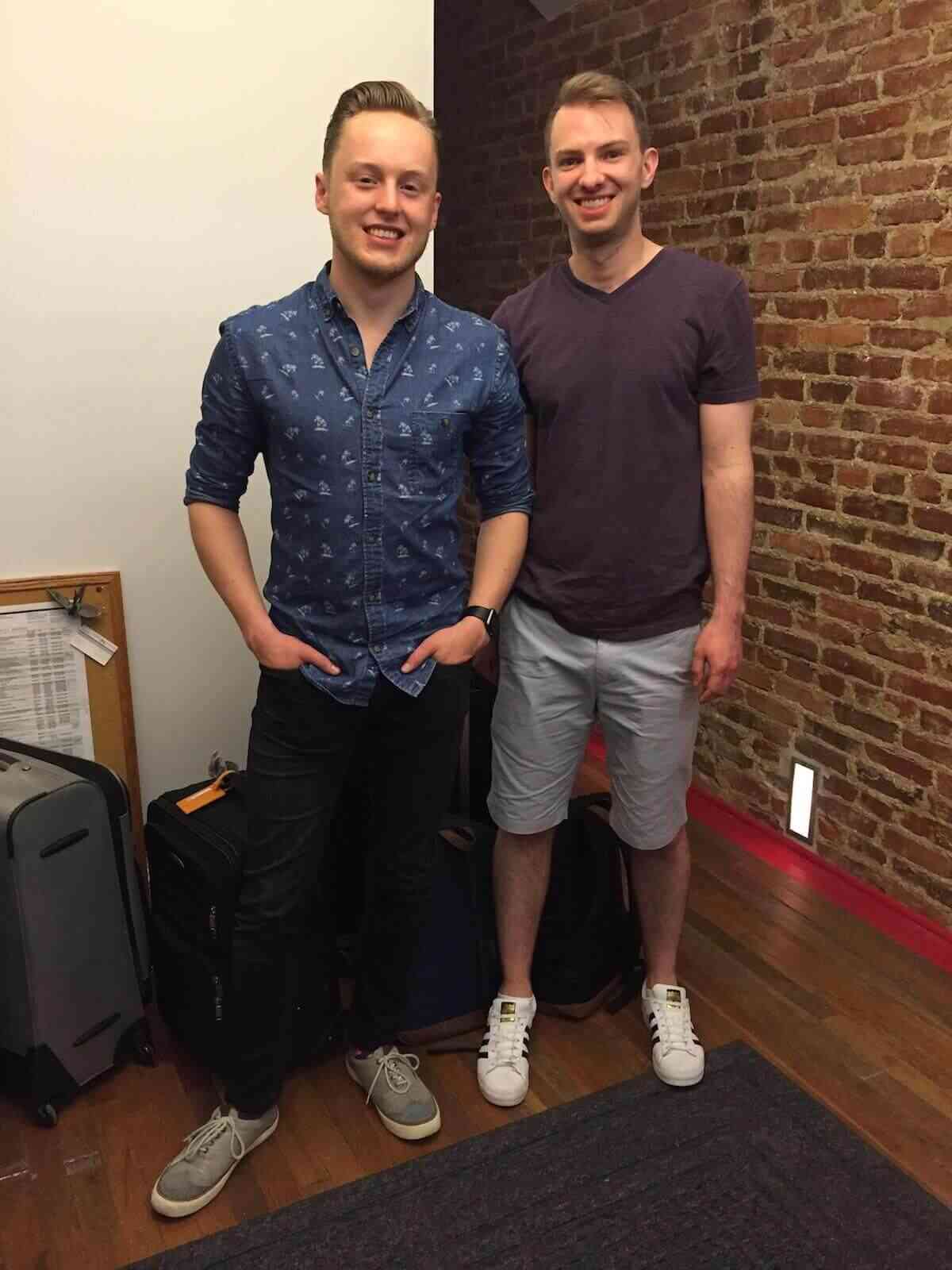
Douwe and Robert on the first day of the trip, just after arriving at their Washington, D.C. apartment
Can you catch a glimpse of the limited-edition GitLab branded socks?
Background
One of the great things about remote work at GitLab is that it doesn't just mean "work your regular 9-to-5 job from home," but rather "work however you like, wherever you like, whenever you like."
We don't believe in fixed working hours, prefer asynchronous communication for most things, encourage people to take as much time off as they need to run errands or just take a break from work, and the main thing we expect from our people is results.
On the other hand, we realize that one of the downsides of remote work is that, while you may see your colleagues every day in chat and video calls, you will likely not have the chance to physically hang out with them more than once or twice a year at a summit or conference.
One of the things we do to help our team members connect and stay connected uses that advantage to combat the downside: we encourage everyone to travel to visit and work with other team members, wherever they may be, and will cover any travel costs to get there.
(It's in the handbook, so it's true!)
The trip
In early 2016, I (Douwe) was trying to figure out how to spend the year and realized that my remote-only job at GitLab gave me a unique opportunity to combine two of my favorite things: travel, and work. I decided to travel for six months, visiting GitLab colleagues around the world to get to know them better, work with them, and see some of the beautiful places our planet has to offer in the process. I dubbed it "Around the World in 6 Releases."
When Robert decided to join a few months later (his response to my invitation was a simple "Sure") the plan was really on.
Two weeks later, just before the release of GitLab 8.9 in June, I flew from Amsterdam to Washington, D.C. to meet up with Robert, and we spent the next six months (and six releases) visiting and working with colleagues all over the world, returning to our respective homes in December, just before the release of GitLab 8.15.
Traveling the equivalent of 2.5 times around the equator over some 31 flights, the trip took us to
Washington, D.C.,
New York City,
Nashville,
Denver,
Salt Lake City,
Las Vegas,
Mexico City,
Rio de Janeiro,
Sofia,
Warsaw,
Nice,
Madrid,
Braga,
Lisbon,
Edinburgh,
Tel Aviv,
Taipei,
Bali,
Sydney,
and finally
Amsterdam
Not shown is the week between Sydney and Amsterdam that we spent in New Zealand, explicitly chosen because we had no one there and because we thought we deserved a vacation after six months of non-stop travel/work.
About halfway through the trip, GitLab CEO Sid realized the tremendous positive impact the trip was having on all of the people visiting, being visited, and following along through our team calls, and the "the company will cover travel costs to visit colleagues" policy was born to encourage more people to make trips like this in the future.
Now that the trip is concluded and we've had a few weeks to reflect, I'd like to share with you some of the things we've learned during this trip.
In the near future, we will also publish a follow-up to "GitLab in Action", covering our travels through Latin America, Europe, Asia, and Oceania in more detail.
Insight 1: GitLab feels like one big team of friends
One of the first things we realized on this trip relates to one of our core values at GitLab: Kindness.
Each and every one of the people we met up with, some of whom didn't even know we were coming until just days before we arrived, welcomed us with open arms and made us feel at home in these strange cities and countries.
Many of them invited us into their homes, introduced us to their significant others and/or pets, and took us into town to show us their favorite places to see, work, eat, or have a drink.
Because of the glimpses we have had into each other's lives through the daily company-wide team call and the dozens of chat channels about interests and hobbies, it immediately felt like we were hanging out with a friend, not just "someone from the internet," or "this person I work with." While early conversations often related to our single biggest shared interest – GitLab and work at GitLab – this quickly became just one of the many things we talked about.
Interestingly, this was true regardless of whether they were in our department and we had already worked with them a lot, or if they did something totally different and we had never conversed before. "There are no floors in GitLab", and even though we have multiple functional groups, GitLab feels like one big team.
{: .text-center}
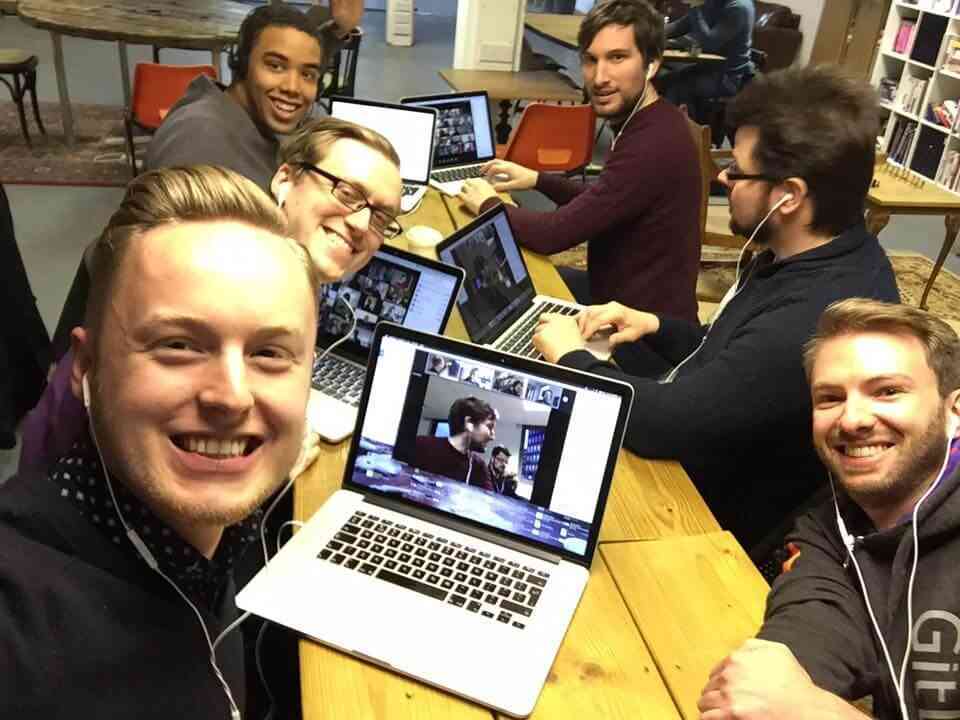
The unofficial Edinburgh GitLab office, with (from left to right) Douwe, James EJ, Sean M, Sean P, Nick, and Robert
Insight 2: Hearing about it is one thing, experiencing it is another
With <%= Gitlab::Homepage.team.members.size %> people in <%= Gitlab::Homepage.team.members.group_by(&:country).size %> different countries, GitLab is the largest remote-only organization in the world, with a wide range of cultures, ways of thinking, and ways of living among its people.
While you hear about things going on in people's lives, about the places they live, and about issues they face, it's hard to truly appreciate and understand these different perspectives at a distance of hundreds, thousands, or tens of thousands of miles. Visiting them, getting to know them in their "natural habitat", and experiencing some bits of their life yourself, bring you closer to that understanding than anything else.
An example of this occurred when we arrived in Taipei, Taiwan to meet with Jen-Shin, and got to experience GitLab from the Asia-Pacific (APAC) region.
Seen from Taipei, the European workday starts at around 4pm, and the American workday doesn't start until 10pm, so there is very little overlap with much of the rest of the team. While your mornings are nice and quiet and offer you a chance to concentrate on your work and catch up on emails and todos without interruption, that changes just when your workday is about to end. You get responses to all of the chat messages and GitLab comments you sent earlier, people start mentioning you on new things, and you are left with a choice: Do I work a little bit more and respond to them now, or do I respond in the morning, effectively blocking them until their morning, a full 24 hours later?
Being the kind, helpful people we are, we chose the former, and as those things go, before we knew it the clock struck 12 and we had been working for 15 hours straight.
Turns out it's really hard to stick to regular working hours when most of the people you work with are half a world away. In the end, we did what Jen-Shin had already found as working best for him: we shifted our workday a number of hours to better align with Europe. Other people work in the morning, take a break for a few hours to do whatever it is people do, and work some more in the evening. Working hours are flexible, so everyone finds something that works for them. Of course, as more people from the APAC region join the team, and as our people get more evenly distributed among timezones, much of this issue will resolve itself automatically.
Another example of an issue our APAC team members face is the inconvenient timing of the daily company-wide Team Call: 8:30am in San Francisco, 5:30pm in Amsterdam, but 12:30am in Taipei. Of course the agenda is in a shared document, but not being able to hear or react live to the stories people share about their lives, or to share your own with the rest of the team, makes you feel like you miss out, and – in a sense – like you are being left out. To help with this, we have started recording all of our team calls including the "what did you do this weekend?" bit, and have a dedicated APAC Team Call for those in that region and anyone else who wants to join, to give them the same regular opportunity to share stories about their lives, and to talk with colleagues about something other than work.
Bottom line is, hearing about these issues from a distance is one thing, but being there and experiencing it yourself is totally different.
{: .text-center}
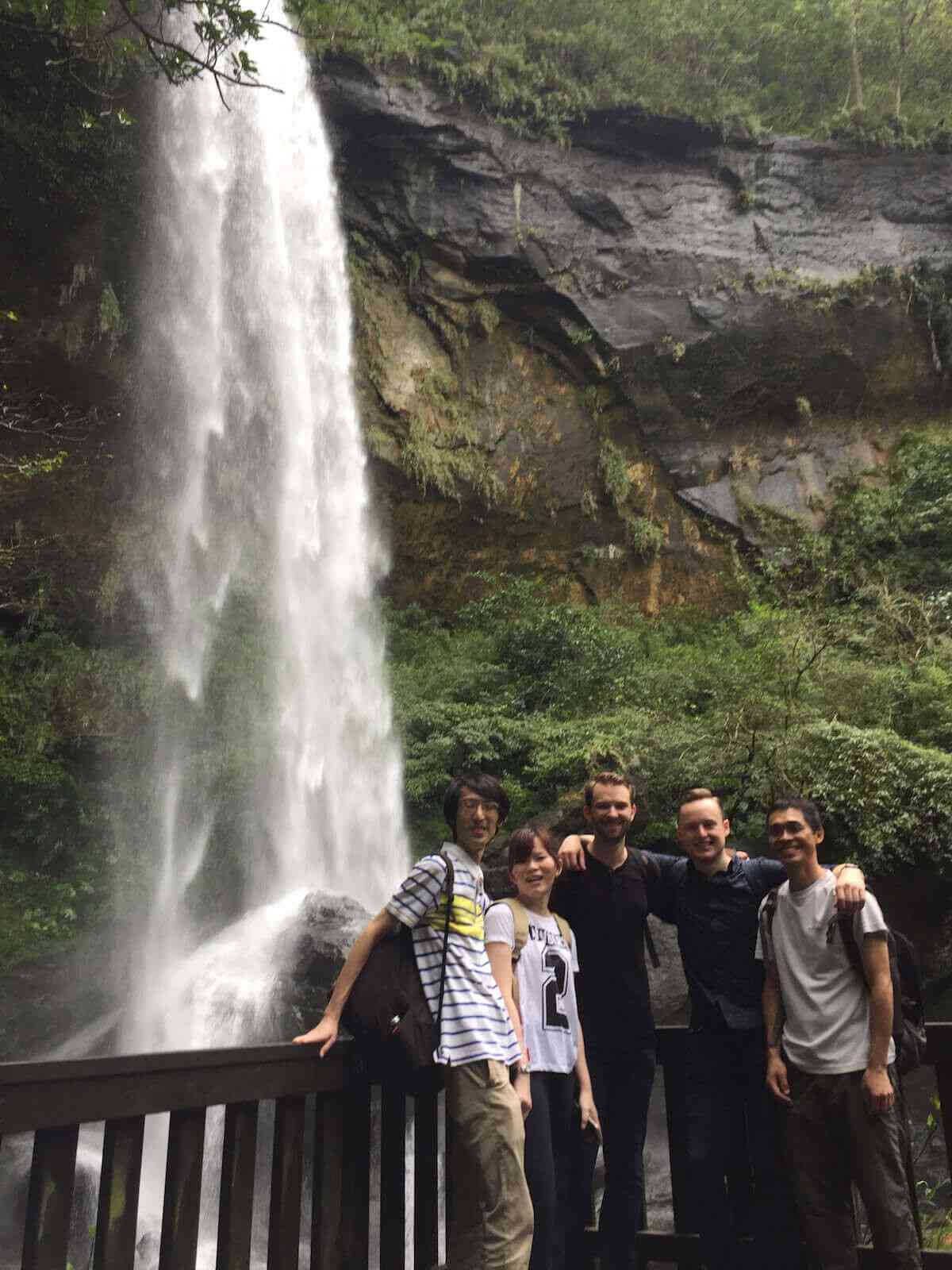
Besides a crazy timezone, Taiwan also has beautiful nature and awesome waterfalls!
From left to right: Jen-Shin, his girlfriend, Robert, Douwe, and Vincent Lin, a hiker/developer friend we made
Insight 3: People valued our visits immensely
The goal of this trip was always to visit colleagues and get to know them better. Of course, it was also a great excuse to travel, and to visit and experience some awesome cities and countries we otherwise might never have seen, or at least not with a local to show us around. We never realized, however, what kind of impact the fact that we traveled so many miles to visit and get to know them would have on some of the people we visited.
Since their words do it more justice than mine, I'm going to let them speak for themselves (emphasis mine):
Marcia, who we met in Rio de Janeiro, Brazil, along with Douglas and Felipe, writes:
After a few months with GitLab, it was very important to me finally meeting people in person, it made me feel more human in our virtual world. More exciting yet, was hanging out with such amazing guys, interested in what we have to share, in what we think about our job, how we feel about working remotely, what is awesome about GitLab and what we feel is missing. Such openness makes us feel included, touched.
For our tech-generation, strengthening our relationships is essential, otherwise everything around us ends up superficial; we won’t ever feel fulfilled. As we usually spend most of our time working, it is so important to be with people, to share our concerns, to help, to collaborate, to participate, and to have moments of joy. I feel so grateful for having met these folks face to face. Thanks guys, and thanks GitLab for allowing us to do this kinda thing!
Pedro, who we met in Lisbon, Portugal, writes:
I believe it was a rich experience for everyone. I gave them some nice memories of Lisbon and, in return, they brought GitLab’s values and culture to my doorstep. As a new GitLab team-member, I was in “sponge mode”. After all, I had two experienced team members in front of me, that inhale and exhale GitLab. Also, as remote workers, it’s uncommon to spend so much time talking and hanging out with other team members. Their stories made me appreciate GitLab even more, and I felt valued with their presence.
Eliran, who we met in Tel Aviv, Israel, writes:
Meeting with Douwe and Robert provided quality time to work together and casually bounce around ongoing matters with them in a way that is otherwise a bit cumbersome when working remotely. I feel this sort of casual channel of communication is lacking from the remote work environment and having a few days to work together face-to-face was a real treat. To make things better, we were able to hang out and get to know each other on a personal level in an opportunity you might not get in a "classic" office setting with your colleagues. I was able to invite them over to my house, give them the tour of my home office, introduce them to my wife and tour our city together.
Conclusion
This trip has been one of the most, if not the most, rewarding experiences of our lives. Not in the least because of the insights listed above, but first and foremost because of all of the amazing people we have gotten to connect with at a deeper level, all of the things we have experienced together, and all the beautiful places we have been able to see with them.
We would like to thank all of the people we visited for welcoming us with open arms into their cities and, in many ways, their lives. You (and everyone else at GitLab) are welcome in our homes anytime.
We would like to thank GitLab for making these things possible through the way we work, for actively encouraging trips like this by covering a significant portion of the cost, and ultimately for having built a company with a culture and team like no other.
This post is one in a series about this particular trip. Check out GitLab in Action part 1 and part 2!
{: .text-center}
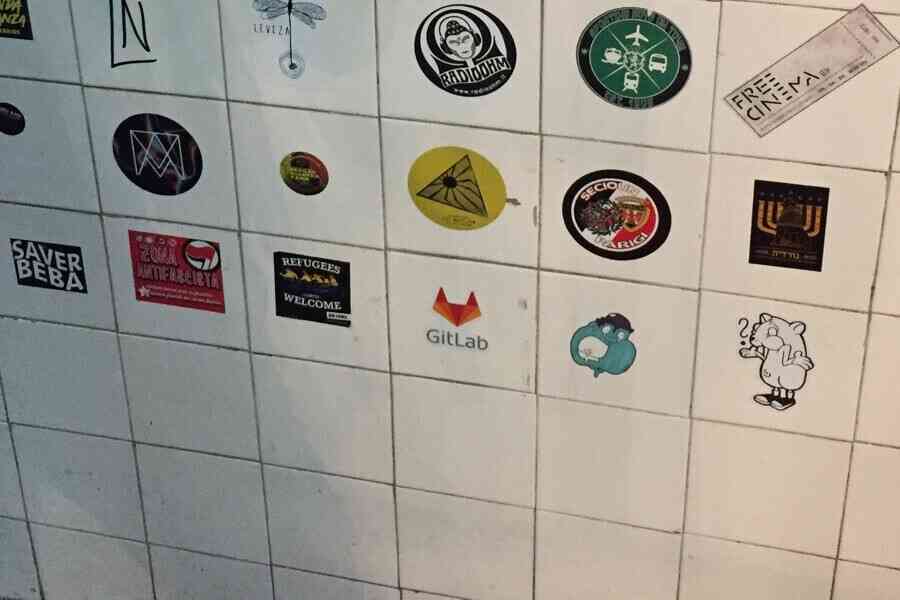
On a wall in Lisbon, Portugal: Evangelizing GitLab, one sticker at a time
